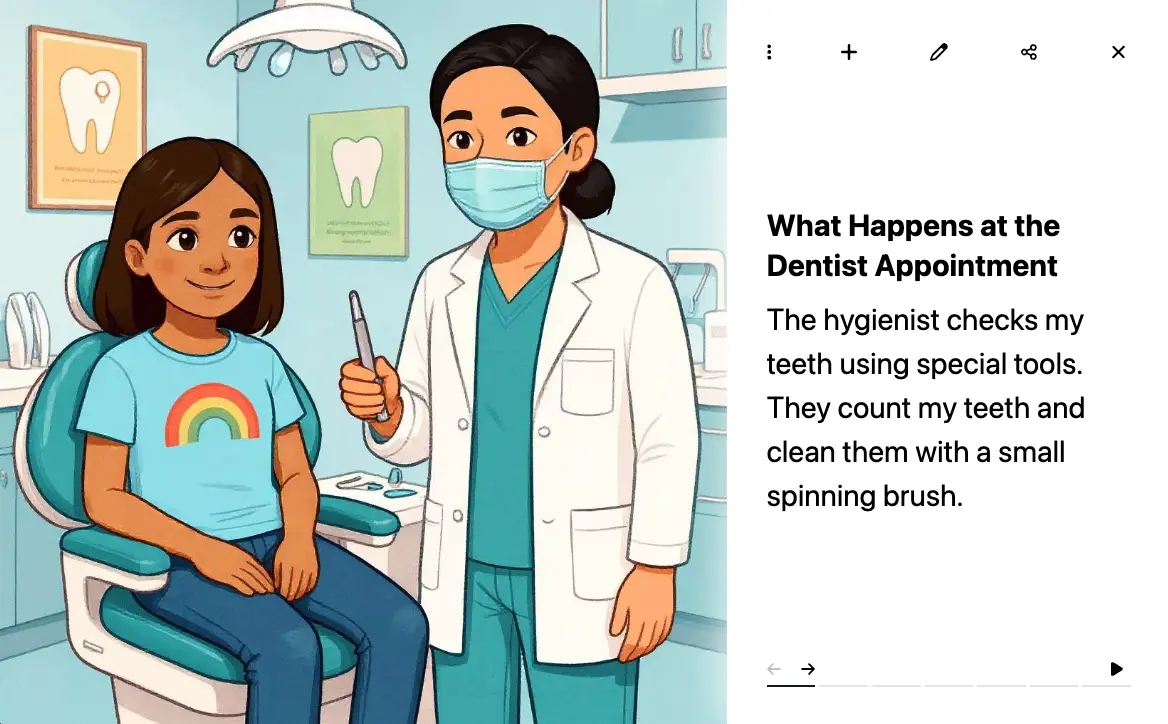
The reminder notification pops up: "Sara's dentist appointment tomorrow at 8 AM." Your stomach drops. You've been dreading this moment since the last appointment, where the hygienist struggled to look in her mouth, let alone clean a tooth. The last dental visit was a disaster — screaming, bribing, pleading and the mortifying looks from other parents in the waiting room on your way out. Part of you considers canceling, but you know you can't keep putting it off.
If this scenario feels familiar, you're not alone. Many parents find themselves caught between knowing their child must do certain things and fearing the unpredictable reactions that might come with them. The grocery store, the doctor's office, family gatherings — these everyday situations can feel like navigating a minefield when you're unsure how your child will respond.
But here's what many of us learn the hard way: avoiding these situations doesn't help your child and it only makes it harder in the future. And more importantly, there's a better approach than just hoping for the best.
When we're stressed about an upcoming event, it's tempting to avoid talking about it with our children. We might think, "Why upset them ahead of time? Maybe they'll just handle it better if we don't make a big deal about it." This approach, while well-intentioned, often backfires spectacularly.
Consider the dentist visit. Your child walks into an unfamiliar office, encounters strangers, hears mysterious sounds, and suddenly finds themselves in a chair with bright lights and unfamiliar tools approaching their mouth. For a child who thrives on routine and predictability, this can be overwhelming. What could have been a manageable experience becomes traumatic, creating negative associations that make future visits even more challenging.
The truth is, "winging it" isn't actually easier — it's snowballing the stress because it makes you anxious and in turn you pass that stress on to your child. And for children, this can create lasting anxiety around situations that are simply part of life.
The alternative approach requires more upfront effort but pays off big time: thorough, thoughtful preparation. This doesn't mean over-preparing or creating anxiety where none existed. Instead, it means giving your child the tools they need to understand feel and in control.
Preparation works because it removes the element of surprise. When children know what to expect, they can use their energy to cope with the experience rather than trying to process completely new information in real-time. This is especially crucial for children who need extra time to process changes or who find comfort in routine and predictability.
Let's return to the dentist example. Instead of avoiding the topic until you're pulling into the parking lot, you can begin preparing days in advance. This might include:
The challenge many parents face is knowing how to create these materials quickly and effectively. You might think, "I'm not an artist," or "I don't have time to make elaborate visuals." This is where modern tools can be game-changers.
Whether you need a social story that walks through the dentist visit step-by-step, a visual schedule showing the sequence of events, or picture cards that help your child communicate their needs, these resources can be generated quickly and tailored to your child's specific interests and comprehension level with tools like Ella.

The beauty of personalized preparation is that it speaks directly to your child's world. Instead of generic pictures, you can create materials that reflect their favorite colors, characters, or interests. A child who loves dinosaurs might be more engaged with a story about "Dino's Dental Adventure" than a standard book about dental hygiene.
The principles that make dental visits more manageable apply to countless other situations:
New restaurants: Create a visual menu ahead of time, showing what the restaurant looks like and what food options are available.
Family gatherings: Prepare a schedule of events, identify quiet spaces for breaks, and practice greetings and social interactions.
Medical appointments: Use visual schedules to show each step, practice positioning and procedures at home, and prepare comfort items.
School events: Review the schedule, practice transitions, and identify key people and places.
The key is starting early enough that preparation feels routine rather than stressful. When you make preparation a regular part of approaching new situations, it becomes a life skill rather than a special accommodation.
If you've been avoiding community outings or new experiences because you're worried about your child's reactions, it's time to reframe your thinking. Instead of seeing these situations as potential disasters, try viewing them as opportunities for growth both for your child and for you.
Every successfully navigated new experience builds skills. Every time your child encounters a new situation and gets through it, they're learning that they can handle the unexpected. This doesn't mean every outing will be perfect, but it does mean that both you and your child are building resilience.
Remember, other parents in waiting rooms and public spaces are usually far more understanding than we imagine. Most have been in similar situations with their own children. The judgment we fear is often more in our heads than in reality.
Ready to start preparing for success? Here's how to begin:
Preparing for unfamiliar situations isn't just about making individual experiences easier it's about building a foundation for lifelong confidence and independence. Every time you take the time to prepare thoughtfully, you're teaching your child that new experiences are manageable and that they have the tools to handle whatever comes their way.
Yes, it takes more effort upfront. Yes, it might feel like "overkill" for situations that other families navigate without a second thought. But for your child, this preparation isn't excessive — it's exactly what they need to thrive.
The world is full of new experiences waiting for your child. With the right preparation, you and your child can approach them with a concrete plan. Your child's unique needs aren't obstacles to overcome they're simply information that helps you prepare more effectively.
So go ahead and schedule that dentist appointment. Plan that family outing. Sign up for that new activity. With preparation as your foundation, you're not just helping your child succeed — you're opening doors to a world of possibilities.